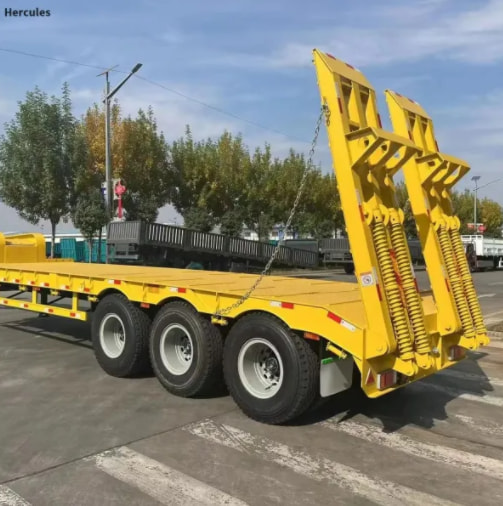Understanding the Different Types of Semi-Trailers and Their Uses
In the realm of modern logistics and transportation, the importance of semi-trailers is undeniable. These vehicles facilitate the efficient and secure movement of goods across extensive distances. As the needs of various industries evolve, the diversity and customization options for semi trailers have expanded considerably. Professionals in freight and transportation are continuously searching for the most suitable semi-trailer types tailored to their specific requirements, allowing them to transport goods of different sizes, weights, and conditions with ease.
Key Features and Operational Functions of Semi-Trailers
A semi-trailer is a unique type of trailer specifically designed to be towed by motorized vehicles like trucks. Unlike full trailers, which have front wheels, semi-trailers depend on the hauling truck for balance and movement. They can be classified according to their design, capacity, and intended purpose.
The primary categories of semi-trailers include flatbed trailers, dry vans, refrigerated trailers, lowboy trailers, and tanker trailers. Each category is tailored for different logistical needs:
Flatbed Trailers: These versatile trailers can carry loads that do not necessitate an enclosure, including construction materials, machinery, and oversized equipment.
Dry Van Trailers: The most prevalent type for moving dry goods, such dry vans protect items such as retail products, electronics, and furniture from environmental elements, featuring a full set of doors that facilitate loading and unloading.
Refrigerated Trailers (Reefers): Crucial for moving perishable items like food and pharmaceuticals, these trailers are equipped with temperature control systems to keep contents fresh.
Lowboy Trailers: Best suited for transporting bulky, heavy equipment, such as construction machinery, lowboy trailers are designed with low profiles for better stability and safety.
Tanker Trailers: Specifically engineered for the transport of liquids, gases, and chemicals, tanker trailers are manufactured with features that prevent leaks and ensure safe transportation.
Benefits and Application Scenarios for Semi-Trailers
The selection of the appropriate types of semi-trailer is largely determined by the specific application scenario. Each trailer type offers distinct advantages tailored to various industries:
Flatbed Trailers: Their open structure simplifies the loading and unloading of bulky cargo, making them popular in construction, agriculture, and manufacturing for moving machinery and large equipment.
Dry Van Trailers: These trailers are perfect for retailers, electronics firms, or businesses dealing with consumer goods, as their enclosed designs safeguard cargo from damage due to weather conditions.
Refrigerated Trailers: With the increase in demand for perishable goods in the food and pharmaceutical sectors, reefers maintain strict temperature requirements throughout transportation, ensuring quality and freshness.
Lowboy Trailers: Known for their stability when carrying heavy machinery, lowboy trailers are favored across construction, mining, and heavy equipment sectors.
Tanker Trailers: Essential for carrying liquids such as fuel and chemicals, their specialized designs ensure the safe transportation of hazardous or sensitive materials.
Success Stories and User Experiences
Numerous businesses have recorded significant improvements by utilizing the right types of semi-trailer for their logistics. For instance, a prominent construction company enhanced its operations by utilizing lowboy trailers for transporting heavy bulldozers and cranes, which led to increased efficiency by minimizing loading and unloading times.
In another example, a well-known food distribution enterprise employed refrigerated trailers to maintain stringent temperature control while transporting perishable items. This approach not only preserved product quality but also significantly reduced waste and expedited delivery times, consequently boosting customer satisfaction.
Future Prospects for Semi-Trailers and Industry Developments
The future of semi-trailers is intricately linked to advancements in technology, elevated standards of sustainability, and an increase in customization options. With the rising demand for environmentally friendly logistics solutions, manufacturers are integrating fuel-efficient designs and lightweight materials, aimed at lowering emissions and boosting fuel efficiency.
The emergence of automation within the logistics sector has also spurred the development of smart trailer technologies, enabling trailers to communicate with fleet management systems for real-time updates regarding location, temperature, and loading conditions. Such innovations promise to enhance the efficiency, safety, and cost-effectiveness of semi-trailer operations.
Final Thoughts
Choosing the right types of semi-trailer is vital for improving transportation efficiency, reducing costs, and ensuring safety during the movement of goods. Whether you are tasked with transporting large machinery, sensitive perishables, or regular consumer products, selecting the appropriate semi-trailer is foundational to your success. By grasping their core features, benefits, and emerging trends, you empower yourself to make informed choices catered to your business needs.
To explore more about the various types of semi-trailers and how they can optimize your logistics processes, don’t hesitate to reach out to us. Our knowledgeable team is here to offer expert assistance and help identify the ideal semi-trailer to fulfill your requirements.



